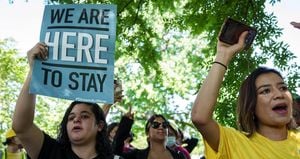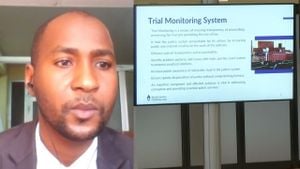Japan's Prime Minister Shigeru Ishiba is making waves both at home and abroad as he embarks on pivotal initiatives aimed at strengthening his leadership and addressing pressing geopolitical issues. Ishiba, who took office on October 1, is facing both domestic challenges and international scrutiny as he heads to South America for key summits.
His first major international engagement since taking office involves attending the Asia-Pacific Economic Cooperation (APEC) forum in Peru and the Group of 20 (G20) summit in Brazil. Just days after the recent elections returned Donald Trump to the White House, Ishiba plans to engage with leaders, including Trump, on the sidelines of these gatherings, underscoring the importance of bilateral relations for Japan's regional strategy.
At the APEC summit, Ishiba aims to discuss the collaborative efforts necessary for fostering economic growth across the Asia-Pacific region. He emphasized the need for Japan to play a more significant role, stating, "I want to talk about how Japan can contribute to fostering economic growth." He also intends to reaffirm commitments to free trade during the talks, which is likely to align with the interests of multiple APEC members, including the United States and China.
Notably, this summit marks Ishiba's first face-to-face meetings with U.S. President Joe Biden and Chinese President Xi Jinping since becoming Prime Minister. Ishiba expressed optimism about fostering trilateral cooperation with the United States and South Korea, building on the foundation laid by his predecessor, Fumio Kishida. This highlights Ishiba's intent to solidify Japan's alliances amid regional instability.
On the cusp of attending the G20 meeting, Ishiba is set to discuss pressing issues such as poverty, global governance, and sustainable development. Brazil's presidency of the G20 emphasizes these themes, and with Russia's war in Ukraine and growing tensions throughout the Middle East, Ishiba's participation is deemed timely.
Domestically, Ishiba's government is grappling with political turbulence, following the Liberal Democratic Party's (LDP) loss of its majority in the recent elections. The LDP and its coalition partners suffered significant setbacks, with Ishiba's approval ratings plummeting to 34%. This has forced the new Prime Minister to seek alliances with the smaller opposition parties to advance his agenda.
The political finance scandal, which drew negative attention to the LDP, continues to impact voter sentiment, prompting Ishiba to prioritize transparency reforms. He aims to introduce new legislation on political funding, hoping to restore public trust. Ishiba plans to mandate the disclosure of expenditures by lawmakers and set up independent oversight on political funds—a move expected to draw backlash from within the party.
Your average Japanese voter is increasingly disillusioned due to rising living costs and inflation. The pressures of economic recovery and defense challenges are also on Ishiba's agenda, as he pushes for military enhancements amid heightened tensions with neighboring nations like China and North Korea.
For Ishiba, the path to solidifying his leadership is laden with challenges. Discussions on military buildup have already begun as he seeks to align Japan's defense capabilities with the changing global security environment. The Prime Minister opened up about the necessity of enhancing military readiness, citing breaches of Japanese airspace by foreign military aircraft as unacceptable. By reinforcing Japan's military strength, Ishiba hopes to navigate worsening security threats.
On the backdrop of these diplomatic endeavors and domestic challenges, he plans to meet with his counterparts from China and South Korea, and his discussions with Trump are anticipated as both leaders have established lines of communication post-election.
Ishiba's first major steps as Prime Minister reflect his recognition of Japan's need to adapt swiftly to both internal and external pressures. Whether these adjustments will successfully court public support remains uncertain, yet he remains steadfast to his goals of economic prosperity and military readiness.
With local elections on the horizon, it will be imperative for Ishiba to demonstrate effective governance—especially as Japan looks to balance its longstanding traditions with the necessity for reform. His diplomatic tours may set the stage for more proactive foreign relations but will require nimble domestic strategies to survive the complex political terrain.



